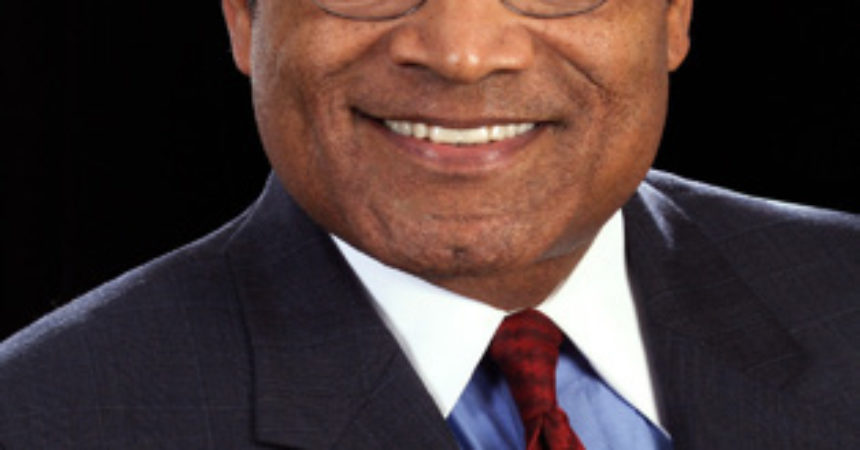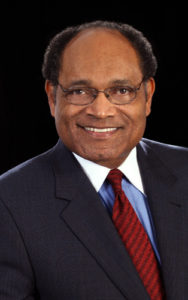
My memories of George H.W. Bush and his vision for inclusion in the GOP

By Clarence McKee
Special to the Outlook
As I watch and listen to the many tributes to former President George H.W. Bush and reminisce looking at some of the photos of me with him and his devoted wife of 73 years, Barbara, I am reminded of his thoughtfulness, honesty, integrity, class, character, and desire for an inclusive Republican Party.
As an example of his kindness and sensitivity, I opened my mail one day to find a nice handwritten note from the then-vice president commending my comments on “Black News,” a local news show on Saturday nights on WTTG-TV, which featured news impacting Blacks in the nation’s Capital.
My first thought was, “I can’t believe the vice president watches Black News.” I was impressed!
During the 1980 presidential campaign, I didn’t start out in the Bush camp as most Black Republicans in D.C.
I had been approached by a dissident group of the local D.C. Republican Party to join a Reagan slate to take over the party then controlled by Bush loyalists. Ironically, one of the people involved in setting up the slate was Reagan operative Paul Manafort.
Also, my best friend and political mentor had become a key official in the Reagan For President campaign and asked me to become involved as D.C. Finance Chair and assist in the campaign, which I did.
After Bush won the Iowa caucuses, prompting a shakeup in the Reagan campaign, Reagan went on to win the New Hampshire primary, get the GOP nomination, and select Bush as his running mate.
After the election, Reagan brought many of his Black supporters to the White House for a meeting which I attended. Some of those who had been early Bush supporters were not invited. To soothe ruffled feathers, a meeting was held at the vice president’s residence in the U.S. Naval Observatory complex with a cross section of Black supporters.
The vice president, always the gentleman, started the meeting by saying he wanted to have a candid discussion on what was on the minds of those in attendance and that it was important that all were on the same team.
Several complained about not being invited to the White House meeting or not being consulted despite being long time Black GOP supporters. Bush asked Lee Atwater, a key Reagan adviser who had become Deputy Political Director in the Reagan White House under Ed Rollins, to respond to some of the criticism.
Atwater got right to the point.
He told the group of Black Republicans that if Blacks wanted political respect, they had to stop putting all of their eggs in the Democrat basket. He added that he could predict the percentage of the Black vote for the GOP candidate in presidential elections for years to come.
He went on to stress the political reality — Blacks would be viewed differently by GOP campaigns if there was more political diversity in their voting patterns.
That message applies today.
Bush listened patiently, thanked everyone for their support and said he realized how difficult it can be for Black Republicans. He added that it was important that the GOP do its part and outlined his vision for openness and inclusion in the GOP.
Throughout his vice presidency, Bush was always available to discuss issues that I had in my role as advisor to the Republican National Committee’s Black Republican Council; giving him an overview of my month-long trip to South Africa and views on disinvestment; or leading the District of Columbia Reagan-Bush ’84 Campaign effort; and even career advice.
I left Washington before Bush became president and observed his presidency from afar.
His words at that meeting years before regarding openness and inclusion lived in his administration, including naming Colin Powell the first Black Chairman of the Joint Chiefs of Staff; Dr. Louis W. Sullivan, President Emeritus, Morehouse College of Medicine, as Secretary of Heath and Human Services; and, my friend Arthur Fletcher — known as the “Father of Affirmative Action — as Chairman of the U.S. Commission on Civil Rights.
His sense of loyalty and fair play was exhibited when he stood by another friend, Clarence Thomas, when he was viciously and falsely attacked by Democrats and Anita Hill during his confirmation hearings — just as President Trump stood behind Judge Brett Kavanaugh.
Of course, the media and Democrats accused him of playing the race card with the now infamous “Revolving Door” prison ad in his 1988 campaign against Michael Dukakis. For Democrats to accuse anyone of playing the race card is a real joke given that they have made it an art form.
Bush’s philosophy of inclusion didn’t start when he came to Washington. In a 1992 article, “Bush and the Blacks: An Unknown Story,” Joseph Morely wrote in the New York Review of Books:
“In June 1963, as Harris County chairman, Bush established an organization of Black Republicans called the Republican Alliance and opened an office in a Black neighborhood. He appeared before Black groups. ‘I’m citing [to them] their almost block voting for Democrats who have been outright racists against Republicans who are far from being in that category…’
The GOP could use that kind of outreach today!
Bush’s legacy of compassion and empathy for the poor and less fortunate was exemplified in President George W. Bush’s “No Child Left Behind Act” war against the “soft bigotry of low expectations;” and, Florida Governor Jeb Bush’s pursuit of educational excellence through school and parental choice.
It was an honor knowing him!
ident of McKee Communications, Inc., a government, political, and media relations consulting firm in Florida. He held several positions in the Reagan administration as well as in the Reagan presidential campaigns. He is a former co-owner of WTVT-TV in Tampa and former president of the Florida Association of Broadcasters.
Read Newsmax: My Memories of George H.W. Bush and His Vision for Inclusion in the GOP | Newsmax.com
Urgent: Do you approve of Pres. Trump? Vote Here in Poll







